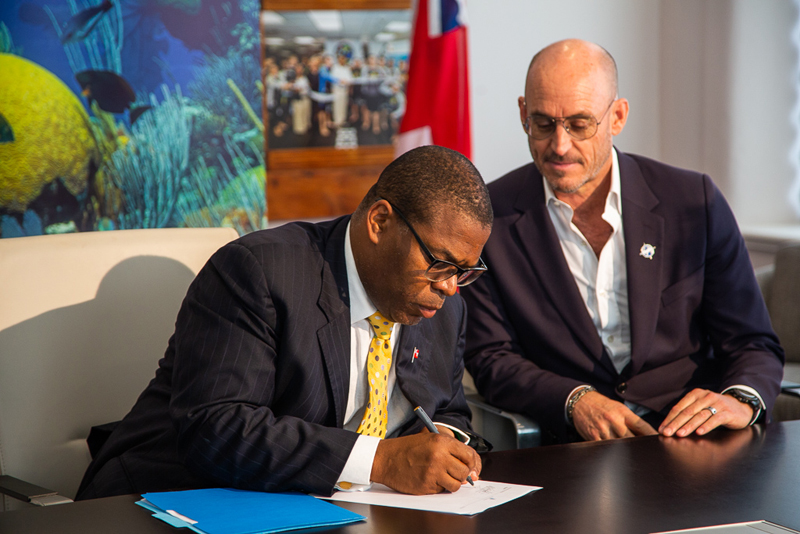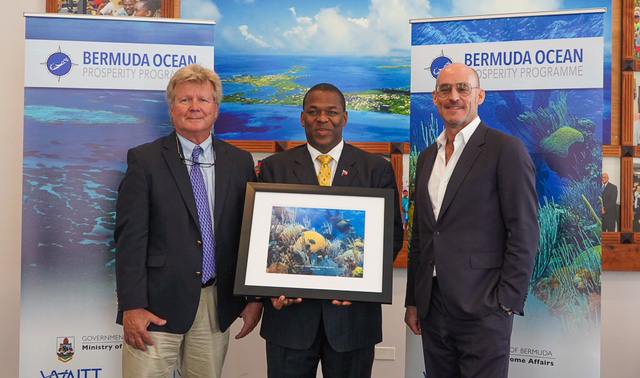The Government of Bermuda has “committed to protect at least 20% of their total Exclusive Economic Zone [EEZ] in marine protected areas [MPAs] while vowing to sustainably develop their Blue Economy,” the Government announced today.
Today [June 5] the Ministry of Home Affairs, the Waitt Institute, and Bermuda Institute of Ocean Sciences [BIOS], signed a Memorandum of Understanding [MOU] to form the Bermuda Ocean Prosperity Programme.
“Through this partnership, Bermuda will create a binding ocean plan to sustainably manage and improve ocean industries like fishing and tourism while at the same time preserving 90,000 square kilometers [50,000 square miles] of Bermuda’s waters, which total 465,000 sq. kilometers [ sq. miles], in fully protected areas [no fishing, extraction, or destruction of any kind is allowed],” a spokesperson said.
“This process will be based on scientific, legal, and socio-economic assessments of the island and will be designated and implemented by 2022. Utilizing marine spatial planning [MSP], new inshore and offshore zones will aim to preserve commercially important fish stocks, migratory routes for marine mammals, and deep-sea ecosystems like seamounts and corals while allowing for responsible development of marine industries.
Deputy Premier and Minister of Home Affairs Walter Roban said, “We Bermudians rely on our ocean for our food, livelihoods, shipping, tourism, climate resilience and recreation. This partnership confirms our recognition that a healthy ocean is essential to our island’s prosperity – our future depends on it. Bermuda is committed to achieving the highest standard of marine protection, which is essential to build ocean resilience, while at the same time ensuring economic resilience.”
“Bermuda has a robust history of ocean management and research, starting with the protection of sea turtles in the early 1600s. The Bermuda Ocean Prosperity Programme will ensure this legacy lives on by leveraging current scientific understanding to preserve marine biodiversity for both its inherent environmental and socioeconomic values. BIOS is pleased to be a part of this initiative that will no doubt serve as a model for other countries around the world,” said Bill Curry, CEO of Bermuda Institute of Ocean Sciences.
The Government noted, “900 km [570 miles] from the Eastern United States, Bermuda’s waters contain the northernmost coral reef ecosystem in the world. While boasting some of the healthiest coral in the Atlantic, Bermuda’s waters face mounting pressures from human activity such as declining fish stocks, sea level rise, and a potential risk of increased tropical storms.”
“The announcement comes in the wake of last month’s United Nations report which warned of unprecedented rates of extinction and asserted that direct exploitation of fish and seafood has the largest relative impact in the oceans. Mounting scientific reports declare that protecting 30% of the ocean in areas with no extraction will help maintain marine resources while maximizing fisheries yields and economic growth. The Programme will help Bermuda achieve international objectives set by the UN 2030 Agenda for Sustainable Development [ODS] 14, the Convention on Biological Diversity [CBD] and the IUCN [International Union for the Conservation of Nature].”

“The Waitt Institute will provide expertise and financing to support the comprehensive marine spatial plan [MSP] that aims to balance ecological, economical, and social priorities of the ocean. The Bermuda Ocean Prosperity Programme is part of the recently-launched Blue Prosperity Coalition, a network of global experts that offer world-class planning, legal, advocacy, strategy, and scientific expertise to help governments achieve 30% marine protection while growing their ocean economies.”
“By taking proactive steps to manage their ocean, Bermuda is not only fostering healthier marine ecosystems, but creating a long-term roadmap for economic growth, food security, and climate resilience. Bermuda is taking the initiative to develop a “future proof” ocean plan that doesn’t just designate protected areas on a map, but builds local capacity and enforcement, involves the stakeholders, and sustainably grows the ocean economy.” said Ted Waitt, Founder and Chairman of the Waitt Institute.
Marine spatial planning was identified as a key tool for islands in the 2018 Ocean Risk Summit, hosted by Bermuda which identified potential global exposures to ocean risk and discussed innovative solutions to tackle its broad-ranging consequences. The MOU announcement has been warmly welcomed by AXA XL, the lead sponsor of the Ocean Risk Summit and one of Bermuda’s largest commercial [re]insurers.
“Given the risk climate change poses to island communities, marine spatial planning provides a sustainable business and resiliency strategy that helps ensure long- term economic growth,” said Charles Cooper, Chief Executive, Reinsurance at AXA XL and Bermuda Institute of Ocean Sciences trustee.
“Bermuda is the latest island nation in the Atlantic Ocean to protect part of their exclusive economic zone [EEZ]. The Governments of the Azores, Barbuda and Curaçao have recently announced similar commitments under the Blue Prosperity Coalition. Ascension Island recently received UK government backing for its call to designate all of its waters as a marine protected area, with no fishing allowed, which would make it the largest fully protected marine reserve in the Atlantic,” the Government said.
Deputy Premier and Minister of Home Affairs Walter Roban’s remarks:
Good afternoon,
We have just completed the signing of a Memorandum of Understanding that will introduce the Bermuda Ocean Prosperity Programme in Bermuda.
The Ministry of Home Affairs, along with the WAITT Foundation and the Bermuda Institute of Ocean Sciences are all partners in this project – and I am encouraged by the work that we will do together.
Today, I am pleased to welcome Mr. Ted WAITT, Founder and Chairman of the WAITT Institute and Dr. William Curry, CEO of the Bermuda Institute of Ocean Sciences, or BIOS.
The signing of this MOU signals a few key developments with regards to our economy, ocean spaces and the preservation of our environment at-large.
Foremost Bermuda will develop and implement an integrated marine spatial plan, similar to the terrestrially based Bermuda Plan 2018 currently under development, by 2021. This will include the entirety of Bermuda’s Exclusive Economic Zone; which stretches 200 nautical miles off shore and totals some 465,000 square kilometers.
This plan, which will be scientifically informed, will foster economic growth by developing an integrated approach to building sustainable ocean industries, such as wind and wave renewable energy solutions and will implement sustainable fisheries policies and programs that create positive incentives to encourage responsible fishing.
It is important to me that the marine spatial plan be an open and inclusive process. Therefore over the next 30 months, as the plan develops, stakeholders and the public can expect to be fully involved in the consultation process.
The Bermuda Government is committed to achieving the highest standard of marine protection, which is essential to building ocean resilience, while at the same time ensuring economic resilience. This agreement details the Government’s commitment to protect at least 20% of our Exclusive Economic Zone, which equates to 90,000 square kilometers out of the total of our 465,000 square kilometers. These areas will be determined through the upcoming consultation process. This protection will create optimal conditions for the improvement of ocean industries like fishing and tourism – while ensuring environmental sustainability of our coastal and ocean areas.
This programme will support the Government’s stated goals of economic growth and diversification – while ensuring that Bermuda’s environment and beauty are preserved. Further a marine spatial plan will support the Government’s aim to incorporate environmental considerations in all Government decision making, and for environmental impact studies to be conducted on all major, and unusual marine developments and projects.
I want to sincerely thank Mr. Waitt for his commitment and that of the WAITT Foundation to provide the funding, expertise and capacity needed to complete this critical work. This project will no doubt leave a lasting legacy of sustainability and economic growth in Bermuda for generations to come.
I would also like to thank Dr. Curry and his team at BIOS for their expertise and knowledge that have been key to this process.
Last but certainly not least, I would like to commend the Department of Environment and Natural Resources for their diligence and direction on this programme as well.
In closing, I would like to draw attention to the fact that today is World Environment Day and thus, I find the signing of this MOU quite fitting and timely. The Bermuda Ocean Prosperity Programme reaffirms this Ministry’s commitment a clean, sustainable and eco-friendly Bermuda. Today is a proud day for us all.
I will now turn it over to Mr. Ted Waitt.
BIOS President and Chief Executive Officer William Curry’s remarks:
Thank you, Minister Roban, Mr. Waitt, distinguished guests.
Bermuda has a long and robust history of ocean management and research, starting with the protection of sea turtles in the early 1600s.
The Bermuda Institute of Ocean Sciences has been in Bermuda in one form or another for more than 100 years. Among its most notable achievements is the development of a decades-long series of measurements of the deep ocean and climate conditions, as well as a more detailed and comprehensive picture of Bermuda’s nearshore marine ecosystems. These activities support not only the advancement of knowledge about our local and global environments, but also benefit local policy-making, education, and conservation.
Our contributions, whether in collaboration with the Government of Bermuda or with international partners, means that Bermuda continues to be a hub of scientific and educational activity that contributes to our understanding of threats to the ocean and the increasing risks posed by climate change.
The Bermuda Ocean Prosperity Programme will ensure this legacy lives on by leveraging current scientific understanding to preserve marine biodiversity for both its intrinsic environmental benefit, and its socioeconomic value. BIOS is pleased to be a part of this initiative that will no doubt serve as a model for other countries around the world.
Thank you


